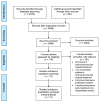Efficacy and Safety of Hydroxychloroquine for Hospitalized COVID-19 Patients: A Systematic Review and Meta-Analysis
- PMID: 34198792
- PMCID: PMC8201261
- DOI: 10.3390/jcm10112503
Efficacy and Safety of Hydroxychloroquine for Hospitalized COVID-19 Patients: A Systematic Review and Meta-Analysis
Abstract
We systematically reviewed the efficacy and safety of hydroxychloroquine as treatment for hospitalized COVID-19. Randomized controlled trials (RCTs) evaluating hydroxychloroquine as treatment for hospitalized COVID-19 patients were searched until 2nd of December 2020. Primary outcomes were all-cause mortality, need of mechanical ventilation, need of non-invasive ventilation, ICU admission and oxygen support at 14 and 30 days. Secondary outcomes were clinical recovery and worsening, discharge, radiological progression of pneumonia, virologic clearance, serious adverse events (SAE) and adverse events. Inverse variance random effects meta-analyses were performed. Thirteen RCTs (n=18,540) were included. Hydroxychloroquine total doses ranged between 2000 and 12,400 mg; treatment durations were from 5 to 16 days and follow up times between 5 and 30 days. Compared to controls, hydroxychloroquine non-significantly increased mortality at 14 days (RR 1.07, 95%CI 0.92-1.25) or 30 days (RR 1.08, 95%CI 1.00-1.16). Hydroxychloroquine did not affect other primary or secondary outcomes, except SAEs that were significantly higher than the control (RR 1.24, 95%CI 1.05-1.46). Eleven RCTs had high or some concerns of bias. Subgroup analyses were consistent with main analyses. Hydroxychloroquine was not efficacious for treating hospitalized COVID-19 patients and caused more severe adverse events. Hydroxychloroquine should not be recommended as treatment for hospitalized COVID-19 patients.
Keywords: COVID-19; hospitalization; hydroxychloroquine; mechanical ventilation; mortality.
Conflict of interest statement
The authors declare no conflict of interest.
Figures






References
-
- Worldometer COVID-19 Coronavirus Pandemic. [(accessed on 22 February 2021)]; Available online: https://www.worldometers.info/coronavirus/
-
- National Institutes of Health . COVID-19 Treatment Guidelines Panel Coronavirus Disease 2019 (COVID-19) Treatment Guidelines. National Institutes of Health; Bethesda, MD, USA: 2020. [(accessed on 22 February 2021)]. Available online: https://www.covid19treatmentguidelines.nih.gov/ - PubMed
Publication types
LinkOut - more resources
Full Text Sources

